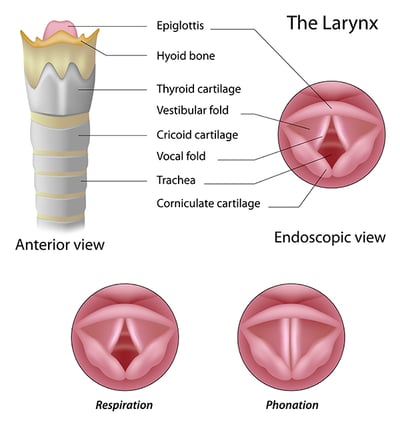Swallowing Difficulties
Functional Problems Following Stroke
Swallowing Difficulties (also known as Dysphagia)
It is estimated that up to 50 percent of those suffering a stroke will have swallowing difficulties, also known as Dysphagia. The process of swallowing is rather complex, requiring the precise coordination of various muscles triggered by sensory feedback. A stroke may cause an imbalance in this process, and this can lead to aspiration (the leakage of food and/or saliva into the breathing passages).
Although some stroke victims will recover from Dysphagia with time, a large number are left with permanent swallowing problems. In more severe cases, this requires a feeding tube for nutrition and tracheostomy tubes to manage mucous secretions. This also results in a three-fold increase in death from lung infections, such as aspiration pneumonia.
For those who do not recover normal swallowing function six months after a stroke, a relatively new surgical treatment is being offered at the Institute for Advanced Reconstruction. Our doctors, pioneers in stroke treatment, may be able to reverse the problem by restoring nerve function to the portions of the throat and airway that have lost normal activity.
The larynx serves several crucial functions for normal swallowing (See diagram).
First, it protects the air passages from food by sensing its presence and instantly closing off the upper airway. Second, the muscles around the larynx move the upper air passage up and away from the esophagus (which pushes food to the stomach) to further prevent the problem. Finally, the larynx houses the vocal cords (voice box) that close tightly to prevent food passage further.
Following a stroke, it is possible that one or more of these functions will become interrupted due to nerve damage, resulting in swallowing difficulties. The most severe form of swallowing difficulty results in aspiration (defined above).
Until now, there have been few options to reverse swallowing difficulties associated with stroke. Treatment has been limited to bypassing food intake through the mouth, and feeding through a tube in the stomach, called a gastrostomy tube. Unfortunately, in addition to severe interruption of normal eating, this does not reduce the chances of life-threatening lung infections (such as aspiration pneumonia).
At the Institute for Advanced Reconstruction, our specialists offer a ground-breaking procedure to stroke victims. This procedure transplants nerves to restore function to the portions of the larynx that are not working properly. Sometimes, the surgery also involves re-positioning the larynx further away from the esophagus. The benefit of the surgery is to re-establish the crucial swallowing functions of the larynx and allow the affected person to eat normally once again. By correcting the swallowing disorder, the person resumes a higher quality of life by returning to an oral diet rather than a feeding tube for nutritional requirements and reduces the chances of dying from dangerous lung infections.
Please contact The Institute for Advanced Reconstruction to learn more about this pioneering work and to schedule a consultation to see if you or someone you know may be a candidate for this procedure.
Vocal cord dysfunction following stroke
Following a stroke, some people have problems with their voices. This is known as vocal cord dysfunction or vocal cord paralysis. The most common manifestations of this disorder are a hoarse and/or weakened voice. Sometimes, there is spontaneous recovery over time; however, there are many people for whom vocal cord dysfunction or vocal cord paralysis following a stroke is a permanent condition.
There are several viable treatment options available, but most of the traditional procedures do not restore normal muscle function to the damaged areas. The doctors of the Institute for Advanced Reconstruction are pioneers in procedures that “restore form and function” to injured parts of the body. That includes people with vocal cord dysfunction and vocal cord paralysis.
Our experts in microsurgical nerve reconstruction surgery offer a procedure to transplant nerves to reverse vocal cord dysfunction following a stroke. This pioneering procedure is another option for people suffering from a hoarse or weakened voice.
Please contact us to learn more.

